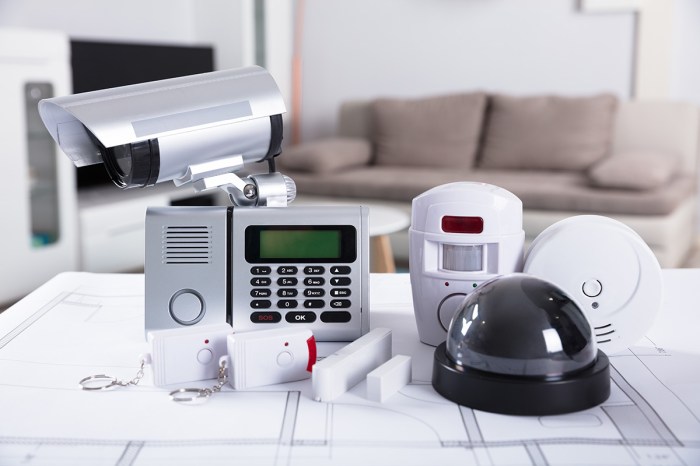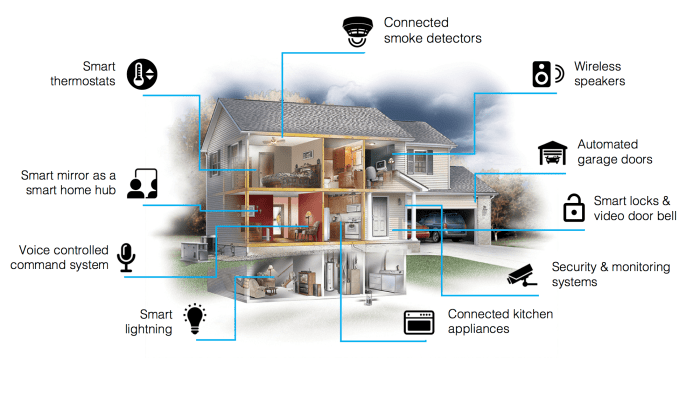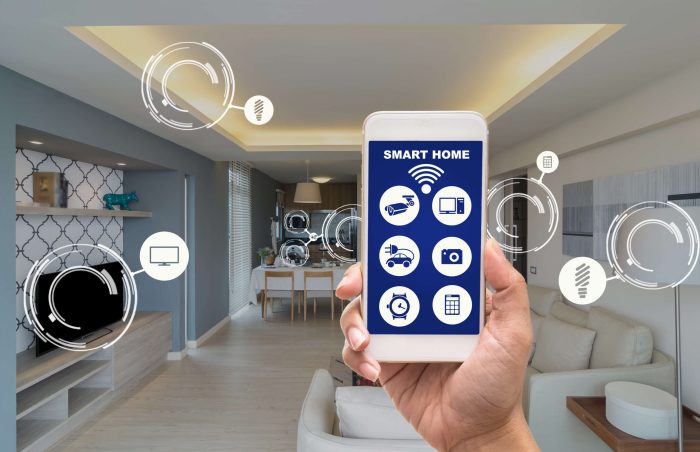As technology continues to transform our lives, the concept of smart homes has emerged as a captivating reality. Smart home system companies are at the forefront of this revolution, pioneering innovative solutions that redefine the way we interact with our living spaces.
From seamless automation to enhanced security and energy efficiency, these companies are redefining the boundaries of home living.
In this comprehensive exploration, we delve into the world of smart home system companies, examining their role, key players, product offerings, technological advancements, challenges, and future prospects. Discover how these companies are shaping the future of home automation and transforming the way we live.
Introduction to Smart Home System Companies

In today’s technologically advanced world, smart home systems have emerged as a transformative force, redefining the way we interact with our living spaces. These systems seamlessly integrate various devices and appliances within a home, allowing for centralized control and automation.
Smart home system companies play a pivotal role in driving this transformation, providing innovative solutions that enhance convenience, efficiency, and security in our homes.
The rise of smart home systems is driven by several factors, including the increasing affordability of smart devices, the growing adoption of IoT (Internet of Things) technologies, and the increasing demand for energy efficiency and security. As a result, the market for smart home systems is experiencing rapid growth, with a projected market value of over $150 billion by 2025.
Current Market Trends
The smart home system market is characterized by several key trends that are shaping its growth and evolution:
- Increased Adoption of Voice Control: Voice-activated assistants, such as Amazon Alexa and Google Home, are becoming increasingly popular, enabling users to control smart home devices with simple voice commands.
- Integration with Smart Appliances: Smart appliances, such as smart refrigerators, ovens, and washing machines, are becoming more prevalent, allowing for remote control and monitoring.
- Focus on Energy Efficiency: Smart home systems are increasingly being used to manage energy consumption, allowing homeowners to monitor and adjust their energy usage.
- Growing Emphasis on Security: Smart home systems are playing a crucial role in enhancing home security, with features such as motion sensors, security cameras, and smart locks.
Growth Potential
The growth potential of smart home system companies is significant, driven by several factors:
- Rising Demand for Convenience: Consumers are increasingly seeking convenience and ease of use in their daily lives, making smart home systems an attractive proposition.
- Increasing Affordability: The cost of smart home devices and systems is decreasing, making them more accessible to a wider range of consumers.
- Government Initiatives: Governments worldwide are promoting the adoption of smart home technologies through initiatives and incentives.
- Technological Advancements: Continuous advancements in technology are leading to the development of more innovative and sophisticated smart home solutions.
Key Players in the Smart Home System Industry
The global smart home system industry is a rapidly growing and dynamic market, with numerous companies vying for dominance. These companies offer a wide range of smart home products and services, including smart speakers, thermostats, lighting systems, security systems, and more.
In this section, we will identify and profile some of the major players in the smart home system industry, providing insights into their history, product offerings, market presence, and strengths and weaknesses.
Amazon
Amazon is a global e-commerce giant that has made significant inroads into the smart home market. The company’s Amazon Echo smart speaker is one of the most popular smart home devices on the market, and its Alexa voice assistant is used in a wide range of smart home products.
Amazon also offers a variety of other smart home products, including smart thermostats, light bulbs, and security cameras.
Strengths:
- Strong brand recognition and customer base.
- Wide range of smart home products and services.
- Alexa voice assistant is widely used and supported.
Weaknesses:
- Concerns about privacy and data security.
- Reliance on third-party manufacturers for some products.
Google is another major player in the smart home market. The company’s Google Home smart speaker is a popular alternative to the Amazon Echo, and its Google Assistant voice assistant is used in a variety of smart home products. Google also offers a range of other smart home products, including smart thermostats, light bulbs, and security cameras.
Strengths:
- Strong brand recognition and customer base.
- Wide range of smart home products and services.
- Google Assistant voice assistant is widely used and supported.
Weaknesses:
- Concerns about privacy and data security.
- Reliance on third-party manufacturers for some products.
Apple
Apple is a relative newcomer to the smart home market, but the company has quickly made a name for itself with its HomeKit platform. HomeKit allows users to control a variety of smart home devices from their Apple devices, including the iPhone, iPad, and Apple Watch.
Apple also offers a range of smart home products, including the HomePod smart speaker, Apple TV, and HomePod mini.
Strengths:
- Strong brand recognition and customer base.
- Easy-to-use HomeKit platform.
- Wide range of smart home products and services.
Weaknesses:
- HomeKit platform is not as widely supported as Amazon Alexa or Google Assistant.
- Apple’s smart home products are generally more expensive than those from other companies.
Product and Service Offerings of Smart Home System Companies

Smart home system companies offer a wide range of products and services that enable consumers to automate and control various aspects of their homes. These products and services can be broadly categorized into the following:
Smart Home Systems
Smart home systems are the core of any smart home setup. These systems typically consist of a central hub that connects to various smart devices and appliances, allowing users to control them remotely using a smartphone, tablet, or voice assistant.
Smart home systems offer a variety of features, including:
- Remote control of lights, thermostats, locks, and other devices
- Scheduling and automation of tasks
- Energy monitoring and management
- Security and surveillance
- Entertainment and media control
Smart Devices and Appliances
Smart home systems work in conjunction with a variety of smart devices and appliances. These devices can be controlled remotely using a smart home system or through their own dedicated apps. Some common types of smart devices and appliances include:
- Smart lights
- Smart thermostats
- Smart locks
- Smart plugs
- Smart TVs
- Smart speakers
- Smart kitchen appliances
Features and Benefits of Smart Home Systems and Devices
Smart home systems and devices offer a number of features and benefits that make them attractive to consumers. These include:
- Convenience: Smart home systems and devices make it easy to control and automate various aspects of the home, saving time and effort.
- Energy efficiency: Smart thermostats and other devices can help to save energy and reduce utility bills.
- Security: Smart home systems can provide peace of mind by allowing homeowners to monitor their homes remotely and receive alerts if there is a security breach.
- Entertainment: Smart TVs and other devices can provide a more immersive and personalized entertainment experience.
- Health and wellness: Smart devices can be used to track fitness, monitor sleep, and manage health conditions.
Pricing Strategies and Business Models
Smart home system companies employ a variety of pricing strategies and business models. Some common pricing strategies include:
- Upfront cost: Some companies charge a one-time upfront cost for their smart home systems and devices.
- Subscription fees: Other companies charge a monthly or annual subscription fee for access to their smart home services.
- Pay-as-you-go: Some companies offer pay-as-you-go plans that allow consumers to pay for only the features and services they use.
Common business models include:
- Direct-to-consumer: Some companies sell their smart home systems and devices directly to consumers through their own websites or retail stores.
- Partnerships with homebuilders and service providers: Other companies partner with homebuilders and service providers to offer smart home systems and devices as part of new home construction or home improvement projects.
- White-labeling: Some companies white-label their smart home systems and devices, allowing other companies to sell them under their own brand.
Smart Home System Technologies and Innovations

The evolution of smart home systems is driven by the integration of cutting-edge technologies that enhance user convenience, security, and energy efficiency. At the heart of these systems lie the Internet of Things (IoT), artificial intelligence (AI), and cloud computing.
IoT Devices and Connectivity
Smart home systems rely on a network of interconnected devices that communicate with each other and a central hub. These devices, ranging from smart thermostats and lighting fixtures to security cameras and door locks, are equipped with sensors and actuators that collect data and respond to commands.
The connectivity between these devices is established through various protocols, such as Wi-Fi, Bluetooth, and Zigbee.
AI and Machine Learning
AI plays a crucial role in smart home systems by enabling devices to learn from user preferences and adapt accordingly. Machine learning algorithms analyze data collected from sensors to identify patterns and make predictions. This allows smart home systems to automate tasks, provide personalized recommendations, and enhance overall user experience.
Cloud Computing and Data Storage
Cloud computing serves as a central repository for data collected from smart home devices. This data is securely stored and processed in the cloud, enabling remote access and control of the smart home system from anywhere with an internet connection.
Cloud computing also facilitates software updates and the integration of new features and services.
Recent Advancements and Innovations
The smart home industry is witnessing a surge of innovations that are transforming the user experience and expanding the capabilities of smart home systems. These advancements include:
Voice Control and Natural Language Processing
Smart home systems now incorporate voice control capabilities, allowing users to interact with their devices using natural language commands. This enhances convenience and accessibility, making smart home technology more user-friendly.
Facial Recognition and Biometric Authentication
Smart home systems are integrating facial recognition and biometric authentication features for enhanced security. These technologies provide a secure and convenient way to control access to the smart home and its features.
Predictive Analytics and Energy Optimization
Smart home systems are leveraging predictive analytics to optimize energy consumption. By analyzing historical data and current usage patterns, these systems can anticipate user needs and adjust settings accordingly, resulting in reduced energy bills and a more sustainable living environment.
Impact on User Experience and the Smart Home Industry
The integration of these technologies has significantly improved the user experience of smart home systems. The convenience of voice control, the security of biometric authentication, and the energy savings from predictive analytics have made smart homes more appealing and accessible to a wider range of users.Furthermore,
these advancements have fueled the growth of the smart home industry. The increasing demand for smart home devices and services has attracted new players and investments, leading to a more competitive and innovative market. As a result, consumers have access to a wider range of smart home products and services, driving further adoption and innovation in the industry.
Challenges and Opportunities for Smart Home System Companies

Smart home system companies face a unique set of challenges and opportunities as they navigate the rapidly evolving landscape of connected devices and intelligent home automation.
Security Concerns
Security is a primary concern for smart home system companies. With the increasing number of connected devices and the potential for remote access, ensuring the security of these systems is paramount. Companies must implement robust security measures to protect user data and prevent unauthorized access or control of smart home devices.
Interoperability Issues
The lack of interoperability among smart home devices and systems is a significant challenge. With various manufacturers offering proprietary solutions, achieving seamless communication and compatibility between different devices can be difficult. This issue hinders the widespread adoption of smart home systems and limits the ability of users to create truly integrated and automated homes.
Privacy Regulations
As smart home systems collect and transmit personal data, concerns arise regarding user privacy. Companies must comply with privacy regulations and implement transparent data handling practices to protect user information. This includes obtaining informed consent, providing clear privacy policies, and ensuring that data is used only for intended purposes.
Opportunities for Growth and Expansion
Despite these challenges, the smart home market presents numerous opportunities for growth and expansion. The increasing demand for convenience, energy efficiency, and personalized home experiences drives the market’s expansion. Additionally, technological advancements, such as the development of more powerful AI algorithms and the integration of smart home systems with other emerging technologies, open up new avenues for innovation and market expansion.
Strategies for Overcoming Challenges and Capitalizing on Opportunities
To succeed in the smart home market, companies must adopt strategies that address the challenges and capitalize on the opportunities. These strategies may include:
- Investing in robust security measures and implementing industry-standard protocols to protect user data and privacy.
- Promoting interoperability and collaboration among manufacturers to enable seamless communication and compatibility between different smart home devices and systems.
- Developing clear and transparent privacy policies, obtaining informed consent from users, and ensuring compliance with relevant privacy regulations.
- Conducting market research and understanding consumer preferences to develop smart home solutions that cater to specific needs and desires.
- Partnering with other industry players, such as energy providers and home builders, to create integrated smart home ecosystems and offer comprehensive solutions to customers.
By addressing these challenges and leveraging the opportunities, smart home system companies can position themselves for success in the rapidly growing and dynamic smart home market.
Future of Smart Home System Companies

The smart home industry is poised for continued growth and transformation in the coming years. As technology advances and consumer demand evolves, smart home system companies will need to adapt and innovate to remain competitive.
Emerging Technologies
Emerging technologies, such as 5G and artificial intelligence (AI), are expected to play a significant role in shaping the future of smart home systems. 5G’s high speed and low latency will enable faster and more reliable data transfer, making it ideal for applications such as real-time monitoring and control of smart devices.
AI can be used to improve the performance and efficiency of smart home systems by automating tasks, providing personalized recommendations, and enhancing security.
Potential Disruptions and New Business Models
The convergence of various technologies and the changing consumer landscape may lead to disruptions and the emergence of new business models in the smart home market. For example, the integration of smart home systems with electric vehicles (EVs) could create opportunities for energy management and optimization.
Additionally, the growing popularity of subscription-based services could lead to new revenue streams for smart home system companies.
Industry Partnerships and Collaborations
Collaboration and partnerships among different stakeholders in the smart home industry will be crucial for driving innovation and growth. This includes partnerships between smart home system companies, technology providers, service providers, and real estate developers. By working together, these stakeholders can create more comprehensive and integrated smart home solutions that meet the evolving needs of consumers.
Sustainability and Energy Efficiency
The increasing focus on sustainability and energy efficiency will continue to influence the development of smart home systems. Smart home systems can play a significant role in reducing energy consumption and promoting sustainable living. For example, smart thermostats and lighting systems can be programmed to optimize energy usage based on occupancy and weather conditions.
Data Security and Privacy
As smart home systems collect and process vast amounts of data, ensuring data security and privacy will be of paramount importance. Smart home system companies will need to implement robust security measures to protect user data from unauthorized access and misuse.
Additionally, consumers will need to be educated about the importance of data security and privacy when using smart home devices.
Summary
The smart home industry stands poised for exponential growth, driven by technological advancements and the ever-increasing demand for convenience, security, and energy efficiency. As smart home system companies continue to innovate and push the boundaries of what’s possible, we can anticipate a future where our homes become increasingly intelligent, responsive, and personalized.
The possibilities are endless, and the future of smart home living is brimming with excitement and endless opportunities.
Helpful Answers
What are the primary benefits of smart home systems?
Smart home systems offer a wide range of benefits, including enhanced convenience, improved security, increased energy efficiency, and the ability to remotely control and monitor various aspects of the home.
How do smart home system companies ensure the security and privacy of user data?
Leading smart home system companies employ robust security measures, including encryption, multi-factor authentication, and regular software updates, to protect user data and maintain privacy.
What are the key challenges facing smart home system companies?
Smart home system companies face several challenges, including concerns about data security and privacy, the need for interoperability among different systems, and the ongoing development of new technologies that may render existing systems obsolete.
What are the future trends in the smart home industry?
The future of the smart home industry is expected to be shaped by the integration of artificial intelligence, 5G connectivity, and the Internet of Things (IoT), leading to even more sophisticated and interconnected smart home systems.